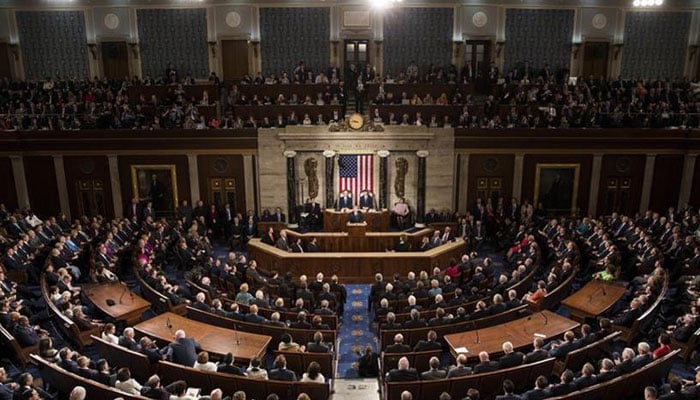US Senate asks India to lift curfew, release detainees in IOK
The US Senate has called on Indian government to lift the lockdown and curfew in Indian Occupied Kashmir (IOK)
ISLAMABAD: The US Senate has called on Indian government to lift the lockdown and curfew in Indian Occupied Kashmir (IOK), fully restore telecommunications and internet services and release individual detainees while approving foreign assistance for India in Department of State, Foreign Operations and Related Programmes Appropriations Bill 2020.
This puts India under the US Senate watch and exposes its assistance to review under a number of human rights acts like Global Magnitsky Human Rights Accountability Act, Human Rights Vetting and other procedures approved by US Congress. The US Senate passed the said bill by 31-0.
This is the strongest bi-partisan condemnation of Indian clampdown after Aug 5 in US Senate led by President Trump’s Republication Party. Already, over 50 members of US Congress have expressed grave concern on the human rights violations in Kashmir. Alice Wells, Acting Assistant Secretary, SCA, South and Central Asian Affairs on September 26 had called on the Indian government to lift restrictions in Kashmir and resume dialogue with Pakistan.
The US Senate has approved total appropriations of over $55 billion for US State Department operations and US assistance worldwide for the financial year that started Oct 1. The approvals include assistance of $120 million for India and $91 million for Pakistan. Indian allocation is stated to secure American national security interests in Indo Pacific region under the new American Indo Pacific Strategy besides other reasons. Pakistan gets its funds under economic support and narcotics control and law enforcement.
A strong focus behind the allocations for US foreign policy is containment of China. An allocation of $2.5 billion has been approved to support the Indo Pacific Strategy and the Asia Reassurance Initiative Act of 2018. The strategy to spend this allocation will be finalised with important allies in Indo Pacific region, specifically the governments of Australia, India, Japan, and South Korea. Out of this allocation, a sum of $375 million is allocated to “Countering Chinese Influence Fund” (CCIF). This fund is meant among other things to counter the impact of Chinese Belt and Road Initiative (BRI) project and other Chinese economic development projects in Burma, Thailand, Laos, Vietnam, Cambodia and other countries in the region. The bill calls on USAID to increase capacity building in the regional governments to limit debt trap transactions by China. The rational for above allocations is development of a blue water navy by China and implementation of a $1 trillion BRI. And that BRI will extend China’s corrupting influences across Asia and Africa and into Europe and Latin America. The bill notes with concern the human rights violations by China, trade war with the United States, cyber intrusions and industrial espionage.
Another area of major concern in the American foreign policy allocations is the role of Russia in American politics, the 2016 elections and Congress campaigns. The bill mentions both China and Russia as jointly trying to subvert American global power and influence through IS and other non-state actors. More than half of the approved funds under international security assistance of $9.1 billion goes to countries in Middle East. Israel gets maximum with $3.3 billion followed by Egypt at $1.3 billion, Jordan and Iraq.
Bangladesh is applauded by US Senate for its role in handling and settling over one million Rohingya refugees from Burma. An allocation of $205 million is made for Bangladesh democracy, labour reforms, Rohingya refugees management and other assistance programmes.
Afghanistan gets $320 million for with special focus on women empowerment and security even after success of Afghan peace plan.
-
 Travis Kelce Plays Key Role In Taylor Swift's 'Opalite' Remix
Travis Kelce Plays Key Role In Taylor Swift's 'Opalite' Remix -
 How Jennifer Aniston's 57th Birthday Went With Boyfriend Jim Curtis
How Jennifer Aniston's 57th Birthday Went With Boyfriend Jim Curtis -
 JoJo Siwa Shares Inspiring Words With Young Changemakers
JoJo Siwa Shares Inspiring Words With Young Changemakers -
 James Van Der Beek Loved Ones Breaks Silence After Fundraiser Hits $2.2M
James Van Der Beek Loved Ones Breaks Silence After Fundraiser Hits $2.2M -
 Disney’s $336m 'Snow White' Remake Ends With $170m Box Office Loss: Report
Disney’s $336m 'Snow White' Remake Ends With $170m Box Office Loss: Report -
 Travis Kelce's Mom Donna Kelce Breaks Silence On His Retirement Plans
Travis Kelce's Mom Donna Kelce Breaks Silence On His Retirement Plans -
 Premiere Date Of 'Spider-Noir' Featuring Nicolas Cage Announced
Premiere Date Of 'Spider-Noir' Featuring Nicolas Cage Announced -
 Pedro Pascal's Sister Reveals His Reaction To Her 'The Beauty' Role
Pedro Pascal's Sister Reveals His Reaction To Her 'The Beauty' Role -
 Kate Middleton Proves She's True 'children's Princess' With THIS Move
Kate Middleton Proves She's True 'children's Princess' With THIS Move -
 Paul Anka Reveals How He Raised Son Ethan Differently From His Daughters
Paul Anka Reveals How He Raised Son Ethan Differently From His Daughters -
 'A Very Special Visitor' Meets Queen Camilla At Clarence House
'A Very Special Visitor' Meets Queen Camilla At Clarence House -
 Jodie Turner Smith Shares One Strict Rule She Follows As A Mom
Jodie Turner Smith Shares One Strict Rule She Follows As A Mom -
 Hailey Bieber Reveals KEY To Balancing Motherhood With Career
Hailey Bieber Reveals KEY To Balancing Motherhood With Career -
 Photo Of Jay-Z, Other Prominent Figures With Jeffrey Epstein Proven To Be Fake
Photo Of Jay-Z, Other Prominent Figures With Jeffrey Epstein Proven To Be Fake -
 Hillary Clinton's Munich Train Video Sparks Conspiracy Theories
Hillary Clinton's Munich Train Video Sparks Conspiracy Theories -
 Fans Slam Talk Show Host For 'cringe' Behavior In Chris Hemsworth Interview
Fans Slam Talk Show Host For 'cringe' Behavior In Chris Hemsworth Interview




